Key takeaways:
- Rehearsals foster creativity and camaraderie among band members, serving as a space for experimentation and learning from mistakes.
- Establishing clear goals and maintaining open communication during rehearsals leads to focused sessions and ignites collective excitement and creativity.
- Implementing a structured rehearsal plan with time blocks and incorporating feedback loops enhances productivity and strengthens band relationships.
- Flexibility and effective communication, including embracing all members’ ideas, are crucial for navigating spontaneity and fostering breakthrough moments in songwriting.
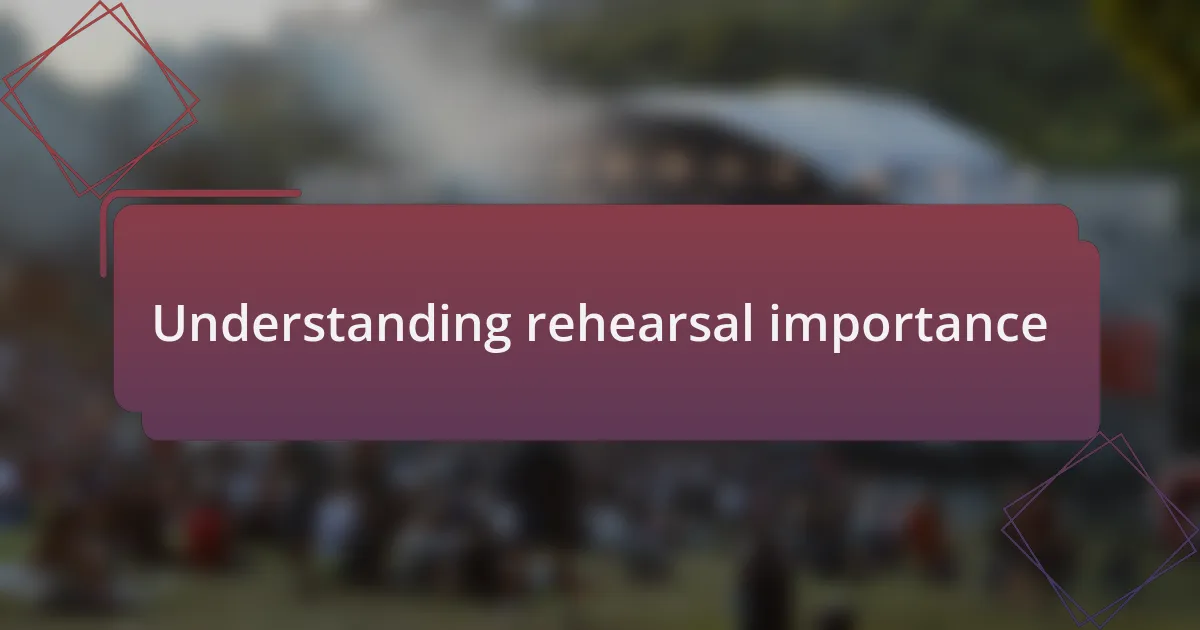
Understanding rehearsal importance
Rehearsals are the heartbeat of any metal band; they transform individual musicians into a cohesive unit. I remember a time when we almost missed a gig because we neglected to rehearse. The tension in the room was palpable as we scrambled to pull everything together last minute, and it was a lesson learned the hard way.
It’s during these sessions that creativity really flourishes. I find that experimenting with different riffs or song structures together not only enhances our sound but also builds camaraderie among band members. Have you ever noticed how music feels far more alive when you share it with others? That magic happens in rehearsals.
Moreover, rehearsals offer a safe space to make mistakes and learn from them. There’s something incredibly freeing about knowing that you can mess up without judgment. I cherish those moments where we can laugh off a missed note or joke about a lyrics flub—it’s these experiences that strengthen our bond as a band, making our eventual performances all that more powerful.
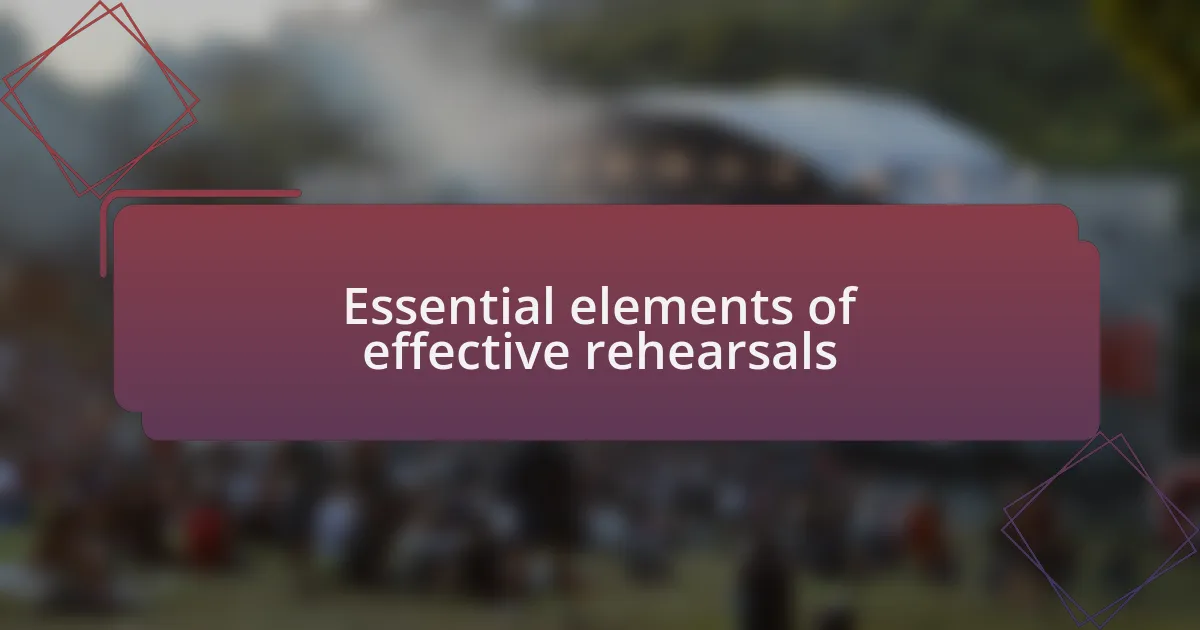
Essential elements of effective rehearsals
One essential element of effective rehearsals is the establishment of clear goals for each session. In my experience, walking into a rehearsal with a specific objective, whether it’s nailing a particular song or fine-tuning transitions, sets a focused tone. I remember one rehearsal where we dedicated time to perfecting a complex solo that had given us trouble. By the end of that session, not only did we conquer it, but our collective excitement skyrocketed, and it felt like we had unlocked a new level in our music.
Another crucial aspect is open communication among band members. I can’t stress enough how vital it is to express thoughts and suggestions. During one rehearsal, we had a heated debate about a vocal line. Instead of shutting down conflicting ideas, we embraced the discussion. It led to an unexpected arrangement that took the song to new heights. Can you imagine the power of sharing creative input like that? It cultivates an environment where everyone feels invested and valued.
Lastly, balancing structure and spontaneity is key. There have been countless times where we’ve set aside a portion of our rehearsal to just jam. I recall a night when an off-the-cuff riff sparked an entirely new song. Those unplanned moments can be the most magical. By allowing room for creativity, we maintain that raw energy that metal thrives on, and it keeps our rehearsals fresh and exciting.
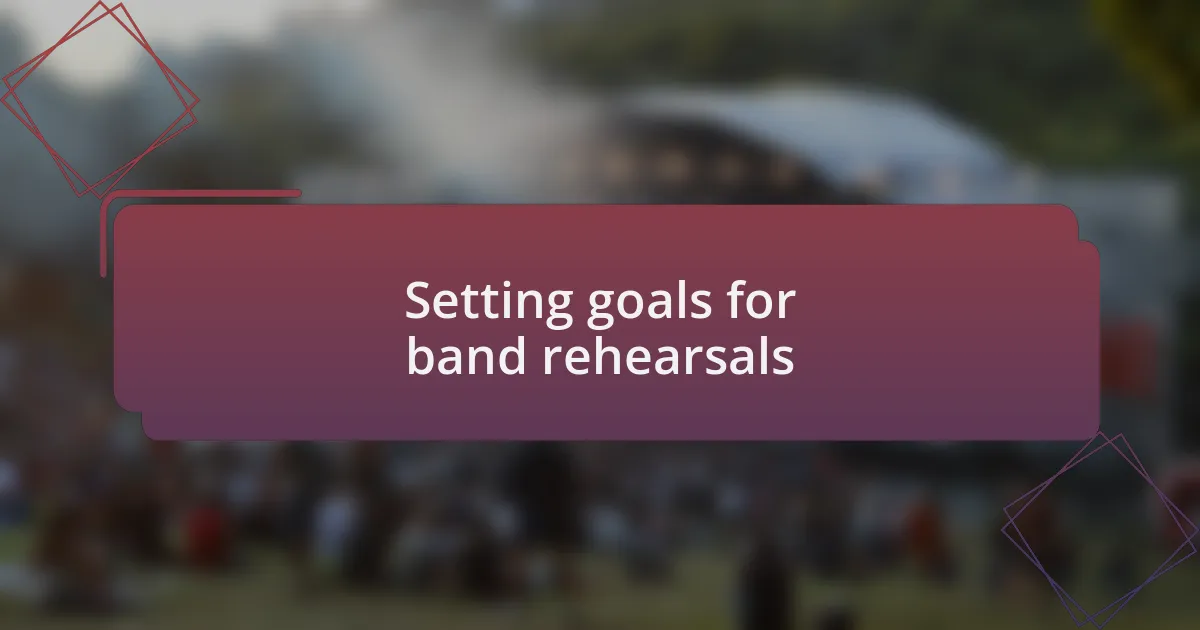
Setting goals for band rehearsals
Setting goals for band rehearsals isn’t just about checking items off a list; it’s about creating a shared vision. I’ve found that discussing our goals as a band before rehearsals helps everyone feel aligned. For instance, there was a time we set out to write a new song, but we ended up getting lost in the details of our sound. What we discovered was that solidifying our vision beforehand kept us focused and energized, making the entire process more fluid.
When I think back to a session where we aimed to refine our live performance, the energy was electric. Each member brought their ideas to the table, and we set clear objectives for our practice. As we tackled the setlist, I noticed how our interactions became more dynamic and collaborative. It was incredible—each small victory fueled our motivation and created a sense of collective achievement that resonated in our performance.
Sometimes, I’ve learned, setting personal goals within the group framework can elevate our rehearsals. One evening, I aimed to work on my stage presence, focusing on connecting with the audience even during practice. While I initially felt awkward, the encouragement from my bandmates transformed the effort into a group activity. It made me realize how personal aspirations contribute to the band’s overall growth, reinforcing that these individual goals can enhance our collective sound. What if every member had a specific target like that? Imagine the synergy we could create together!
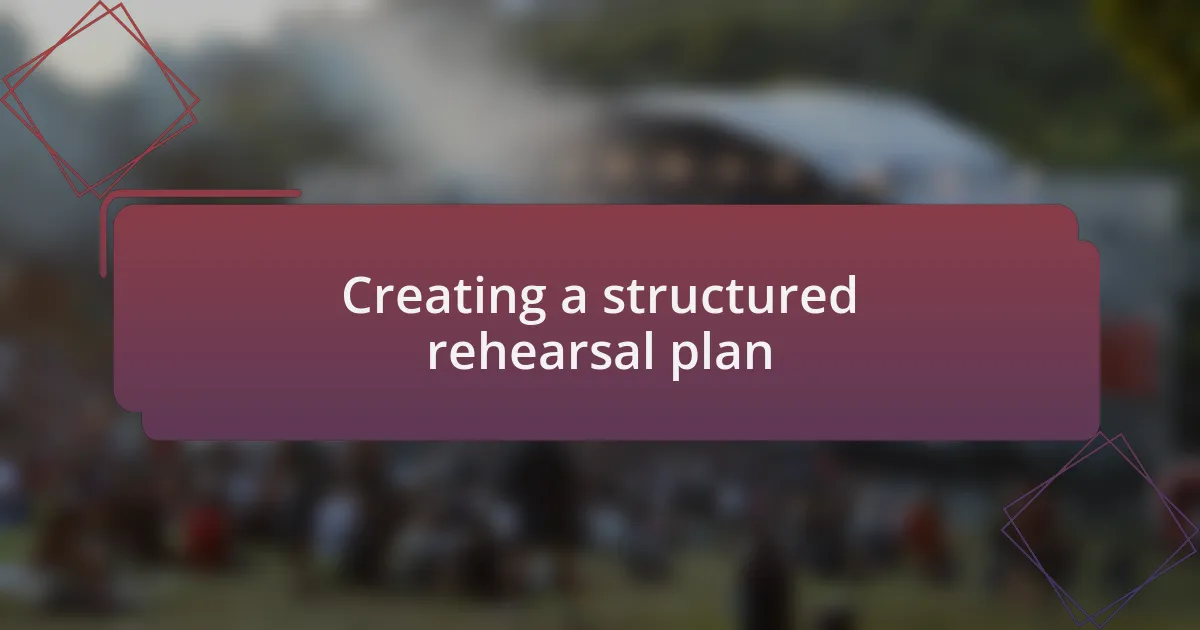
Creating a structured rehearsal plan
Creating a structured rehearsal plan is essential for maximizing our time together. I remember a period when we would just show up and play whatever came to mind. While spontaneity has its charm, I found that taking a few moments to outline what we wanted to achieve helped us stay on track and make real progress. Suddenly, our rehearsals shifted from aimless jamming to focused sessions, and the difference in our sound was palpable.
One method I’ve found effective is allocating specific time blocks for various tasks during rehearsals. For instance, we’d split our time into warm-ups, songwriting, and refining our setlist. Each segment had clear goals, fostering excitement as we moved from one to the next. I felt a rush of creativity when we dedicated an entire block just to experimenting with new riffs. Did I mention how much that discipline unleashed our musical potential?
In my experience, incorporating a feedback loop into our structured plan has emphasized growth and connection. After each rehearsal, we sit down to discuss what worked and what didn’t. This practice not only reinforces accountability but also deepens our relationships as bandmates. It’s eye-opening to hear different perspectives; once, a suggestion from our bassist about timing transformed the way we approached a ballad, making it one of our best tracks. Could a simple feedback session be the key to unlocking your band’s true potential?
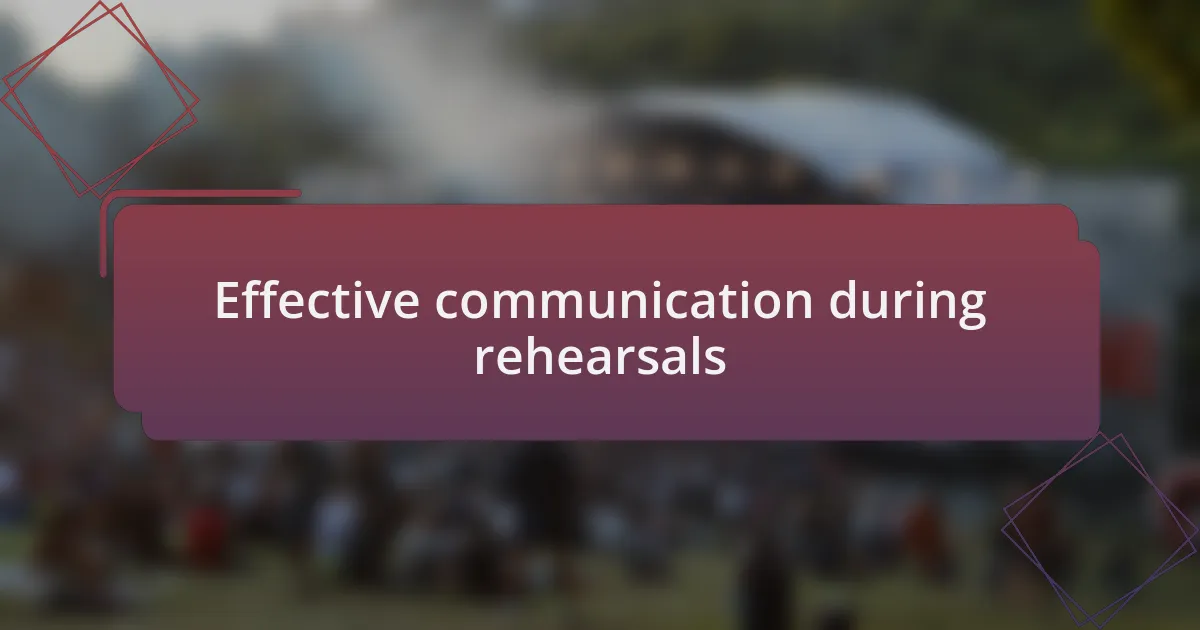
Effective communication during rehearsals
Effective communication is the backbone of any successful rehearsal. I can’t stress enough how crucial it has been for us to openly discuss our ideas and concerns. There was a time when I hesitated to voice my thoughts for fear of disrupting the flow. But when I finally spoke up about a certain song arrangement, it sparked a lively conversation that completely transformed our sound. Have you ever wondered how a single comment could shift the entire dynamic of a band?
Another key element of effective communication is setting ground rules that encourage openness. Early on, we established a “no judgment” policy during rehearsals. This allowed us to share even our most outlandish ideas without the fear of criticism. I recall a moment when our lead guitarist proposed an out-of-the-box concept for a bridge, and instead of dismissing it, we all embraced it. That collaboration fostered a sense of trust, making it easier to explore uncharted territories in our music. Isn’t it interesting how a safe space can lead to artistic breakthroughs?
Lastly, I’ve realized how vital non-verbal communication can be during rehearsals. Sometimes a gesture or a look conveys a whole array of emotions when the music is loud. A well-timed nod from our drummer has often been the cue I needed to know we were in sync. In performances, those unspoken signals can either elevate or derail a set. How do you translate feelings into actions with your band? Understanding these unspoken dynamics has been key to our cohesive sound.
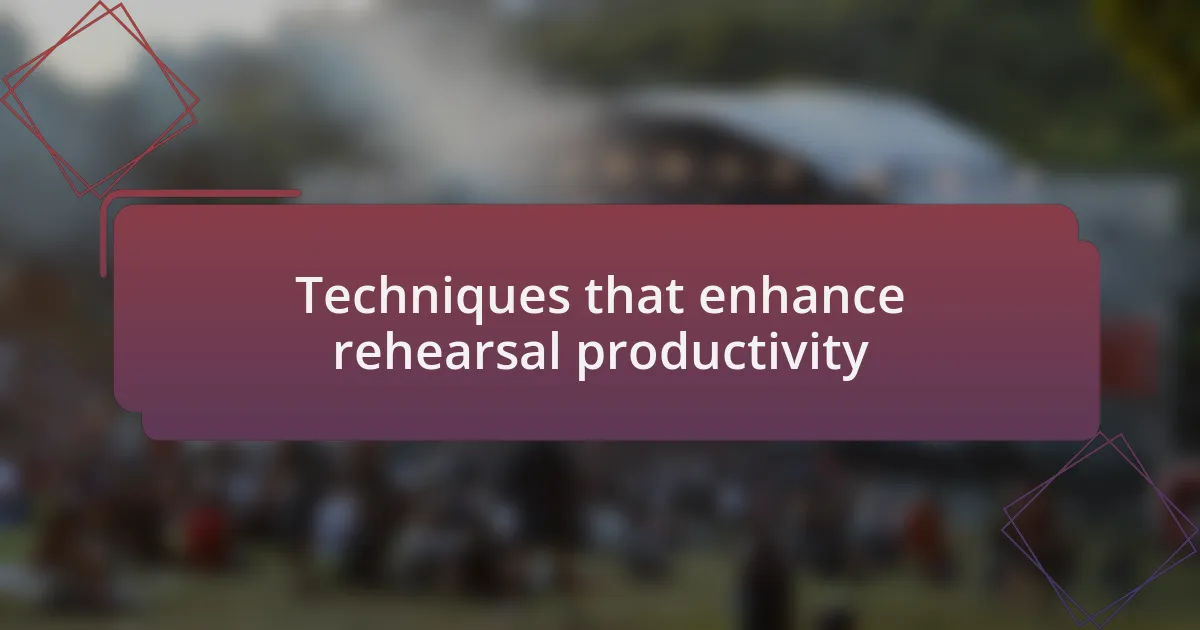
Techniques that enhance rehearsal productivity
When it comes to enhancing rehearsal productivity, I’ve found that starting with a clear agenda makes a world of difference. Before we even pick up our instruments, we gather to discuss what we want to accomplish that day. I remember one particular rehearsal where we laid out specific goals for each song, which not only kept us focused but also turned our practice into a productive workflow. Don’t you think having a roadmap helps keep everyone on the same page?
Another technique that’s been invaluable is the use of time blocks. I suggest dividing our rehearsal time into segments dedicated to different aspects of our music, like trying out new riffs or tightening up our transitions. One time, we spent just fifteen minutes on a tricky section that had been holding us back. I felt the energy shift noticeably; that short burst of focus really helped us nail the arrangement. Have you ever noticed how daily distractions can turn a long rehearsal into a struggle to achieve meaningful progress?
Lastly, I’ve come to appreciate the role of technology in our rehearsals. Utilizing recording devices allows us to capture our sessions and review them later. On one occasion, I recorded a rough run-through of our set, and hearing it back unveiled nuances we hadn’t realized were there, like subtle harmonies that added depth to our sound. How often do you take the time to critique your own performances? This simple act of playback has genuinely transformed our creative process, making us more aware of what truly works for us.

Personal insights on successful rehearsals
In my experience, the atmosphere we create during rehearsals can make or break our productivity. I remember a time when tensions ran high due to personal issues, and it really affected our sound. After acknowledging the elephant in the room, we shifted the mood by playing a fun cover song to break the ice. It was amazing to see how quickly everyone relaxed and re-engaged. Have you ever noticed how laughter can clear the air and foster creativity?
Another key insight I’ve gained is the importance of flexibility within our rehearsal plan. While having an agenda is crucial, sometimes the best breakthroughs happen when we allow spontaneity to take the wheel. For instance, there was an afternoon where we strayed from our set list and started jamming on an idea that emerged organically. That unexpected creativity led to one of our favorite new songs. Have you ever found that some of the finest moments arise from navigating off the beaten path?
Additionally, I’ve discovered that effective communication during rehearsals is essential. We have a rule where everyone can voice their opinions, no matter how outlandish they may sound at first. There was a time when someone suggested a bizarre tempo change, and rather than dismissing it, we explored it together. Surprisingly, that idea evolved into a compelling bridge for one of our tracks. How often do we underestimate the value of every member’s input in shaping our music? It’s these conversations that enrich our dialogue and deepen our collaborative spirit.